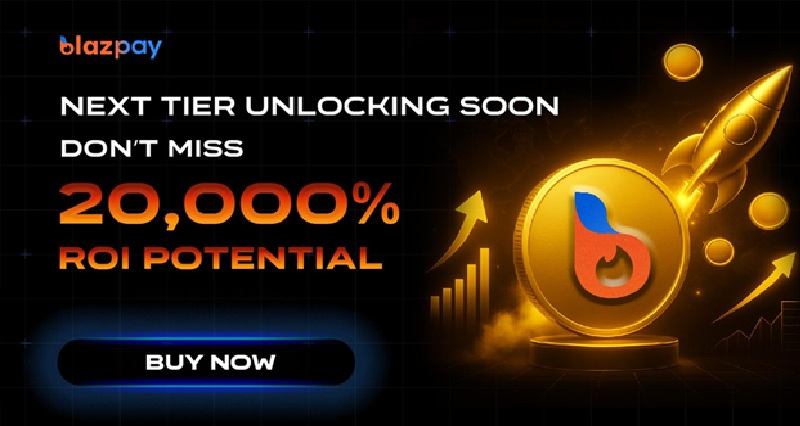The AI crypto coins narrative is rapidly becoming the defining trend of 2025, reshaping how investors view innovation and functionality in the DeFi market. As traditional tokens like Chainlink (LINK) continue to reinforce blockchain stability and institutional trust, new contenders such as Blazpay ($BLAZ) are using artificial intelligence to unlock a new class of intelligent finance.
Blazpay’s AI-powered ecosystem, paired with its Perpetual Trading capabilities, has drawn growing attention across the crypto community. Its Phase 2 presale has already raised $735,000, selling over 105 million tokens — representing 67% completion at a live price of $0.0075 per token. The next phase will increase prices by 25%, marking a critical turning point for investors seeking early entry into one of the best crypto presales this year.
While Chainlink continues to dominate oracle infrastructure, Blazpay is introducing a dynamic, AI-integrated model that merges automation with scalability — signaling what could be the next big crypto coin leading the intelligent DeFi revolution in 2025.
Blazpay’s AI and Perpetual Trading Utilities: Redefining Smart Finance
Blazpay is not just another addition to the growing list of AI crypto coins — it’s an operational ecosystem designed for the next era of intelligent finance.
At the core of its infrastructure lies a self-learning AI execution engine, capable of processing commands and executing financial decisions autonomously. From automated trading to cross-chain liquidity optimization, Blazpay’s AI is built to reduce friction, eliminate manual steps, and increase precision across DeFi operations.
One of its most anticipated features, Perpetual Trading, allows users to open leveraged long or short positions directly within its decentralized platform — without giving up self-custody. These trades are enhanced by AI-backed risk management, ensuring positions are rebalanced automatically during market volatility.
This integration of artificial intelligence with perpetual markets gives Blazpay a unique edge — it’s not just building a new token; it’s architecting a new category of AI-integrated DeFi, earning it recognition as one of the best crypto presales and a frontrunner for 2025’s next major market breakout.
Blazpay Price Prediction 2025: The Next Big AI Crypto Coin
Blazpay’s performance in Phase 2 already indicates substantial early demand — and the market narrative around AI crypto coins is just beginning. Priced at $0.0075, the token provides one of the most accessible entry points in the high-growth AI sector.
A $3,000 investment secures roughly 400,000 BLAZ tokens. If the token rises to its projected presale closing price of $0.16, that position would be worth $64,000 (21× ROI). A listing range of $0.40–$0.50 would increase that to $200,000, signaling a potential 65× return.
In a broader bull cycle, if Blazpay’s adoption matches that of early DeFi disruptors like Uniswap or Aave, analysts estimate long-term valuations could climb beyond $1.00 — or even reach $6.00, a 1,000× ROI that would redefine what early-stage presale success looks like.
Unlike most speculative projects, Blazpay’s real-world utility gives it staying power. With a live AI execution engine, perpetual trading, and a multi-chain backbone, it’s uniquely positioned to become the best crypto coin to buy now among 2025’s presales.

Chainlink (LINK) Price Prediction 2025: Utility Strength Meets Market Stability
While Blazpay rises in the AI-driven DeFi frontier, Chainlink continues to serve as the data backbone of blockchain infrastructure. Its oracle network powers smart contracts across thousands of decentralized applications, delivering secure, real-world data to the blockchain — a foundation that remains critical for institutional adoption.
Trading near $18.50, Chainlink has demonstrated resilience amid fluctuating market conditions. Its expanding partnerships with enterprise networks like SWIFT, Google Cloud, and Avalanche signal a deepening role in cross-chain data security.
Chainlink Price Forecast (2025–2026):
- Short-Term (Q1 2026): $22–$26
- Mid-Term (Mid-2026): $30–$35
- Bullish Scenario: $40+ as institutional integration scales
Analysts emphasize that while LINK offers sustainable, mid-range returns, its mature market cap means slower compounding compared to early-phase projects like Blazpay. As DeFi shifts toward intelligent, user-driven systems, AI-integrated platforms are expected to outperform traditional utility networks in terms of ROI potential.
Analysts’ Take: Chainlink Represents Strength — Blazpay Represents Ascent
In the current cycle, market experts are advising diversified exposure between reliable market leaders and innovation-driven newcomers. Chainlink embodies structural trust, forming the data core of decentralized infrastructure. Blazpay, on the other hand, symbolizes the next leap forward — where intelligence replaces manual interaction and users trade, stake, and transact under AI guidance.
While LINK may see stable 2× to 3× returns, Blazpay’s potential upside could exceed 50× or more, especially as crypto presales 2025 attract institutional and retail attention. This duality — stability versus scalability — highlights why analysts are calling Blazpay the next big crypto coin, bridging today’s proven systems with tomorrow’s automation-led DeFi revolution.
How to Buy Blazpay ($BLAZ)
- Visit the official website — www.blazpay.com
- Click “Join Presale”
- Connect your preferred wallet (MetaMask, WalletConnect, or Coinbase Wallet)
- Select your payment method — BNB, ETH, SOL, MATIC, or USDT
- Approve your transaction and monitor your tokens in the presale dashboard
Conclusion: From Chainlink’s Infrastructure to Blazpay’s Intelligence — The Future Is Automated
The market is moving beyond data and into decision-making — and Blazpay represents that shift. While Chainlink anchors the Web3 data economy with unmatched reliability, Blazpay is pioneering the next era of decentralized automation through AI execution and Perpetual Trading.
With $735K raised, 67% of Phase 2 completed, and a price increase on the horizon, Blazpay’s presale embodies the momentum driving AI crypto coins into the mainstream. As 2025 unfolds, it’s becoming increasingly clear — the projects that automate will outperform those that merely inform, and Blazpay may very well be the next big crypto coin leading that evolution.

Join the Blazpay Community:
www.blazpay.com
@blazpaylabs
t.me/blazpay
FAQs
- What makes Blazpay stand out among AI crypto coins?
Its combination of AI-driven execution and Perpetual Trading makes it one of the first fully intelligent DeFi ecosystems of its kind. - How much has Blazpay raised so far?
Blazpay has raised $735,000 in its ongoing Phase 2, selling 105.3M BLAZ tokens (67% complete). - What is Chainlink’s price prediction for 2025?
Analysts project LINK could reach $30–$35 by mid-2026, with potential to hit $40+ if enterprise adoption continues accelerating. - What’s Blazpay’s current presale price?
Blazpay’s token price is $0.0075, with a 25% increase scheduled in Phase 3. - Why is Blazpay considered one of the best crypto coins to buy now?
Because it offers real AI functionality, perpetual trading, and scalable architecture — all within an early-stage presale entry point. - How do I participate in the presale?
Visit www.blazpay.com, connect your wallet, choose your payment token, and secure your allocation before Phase 3.







